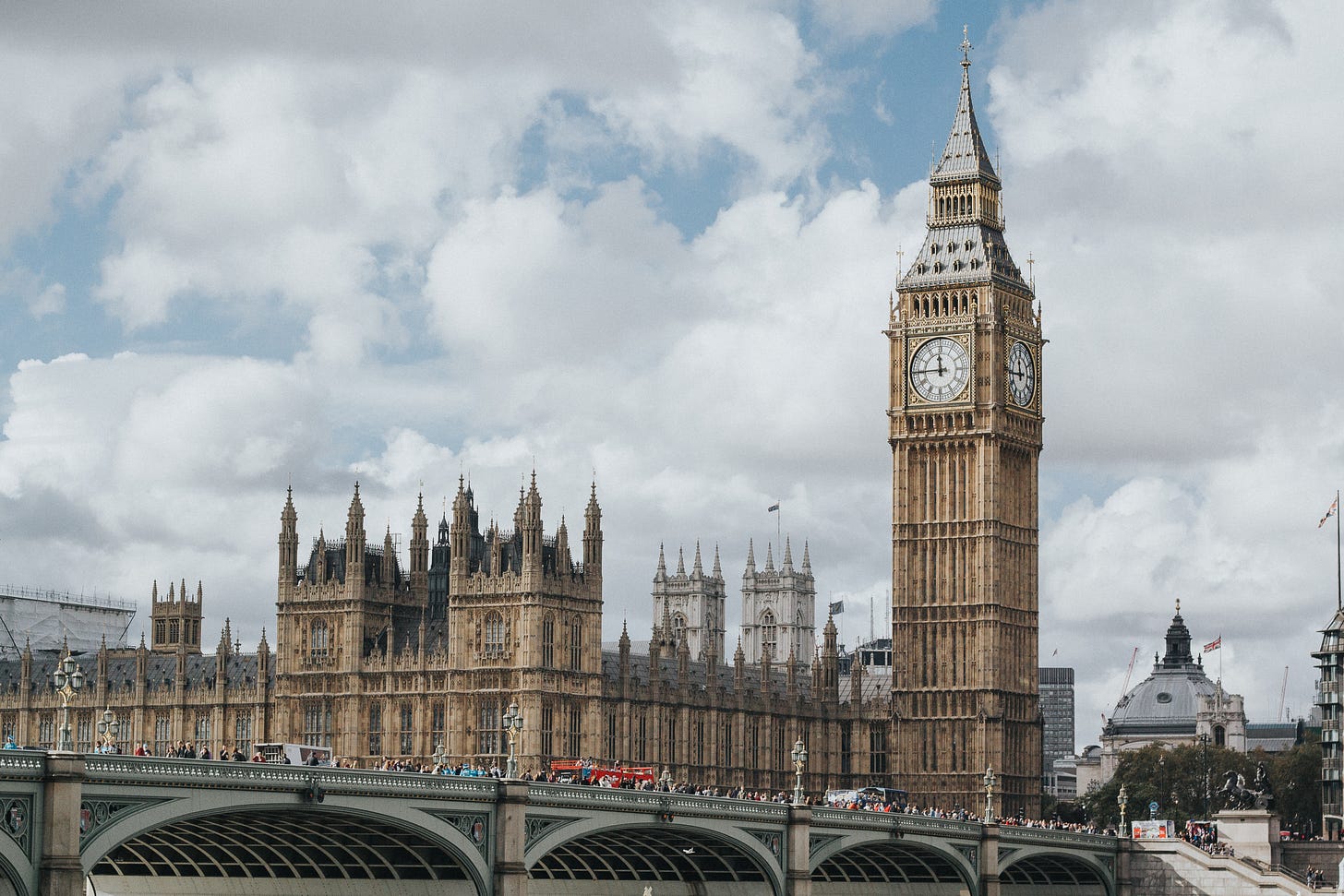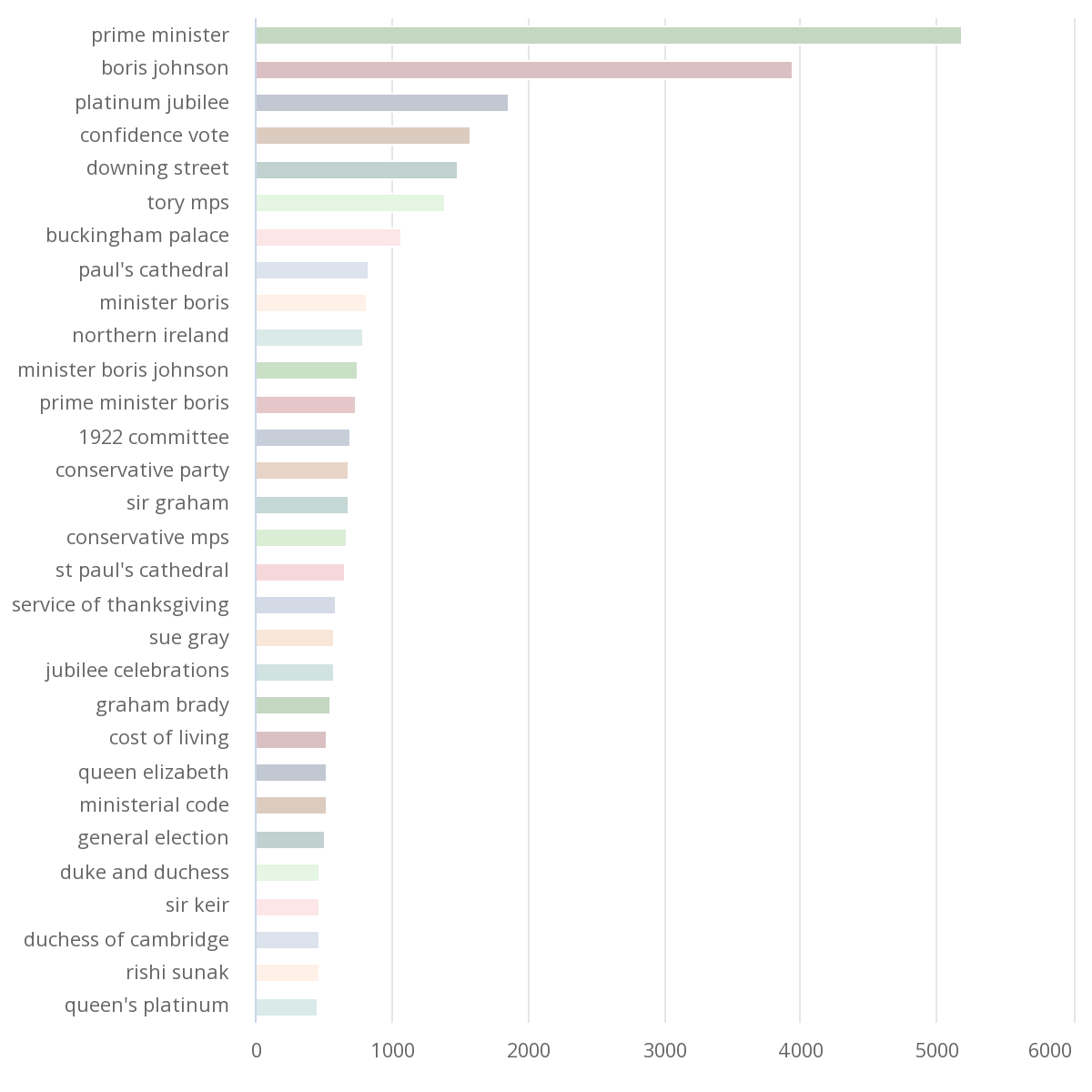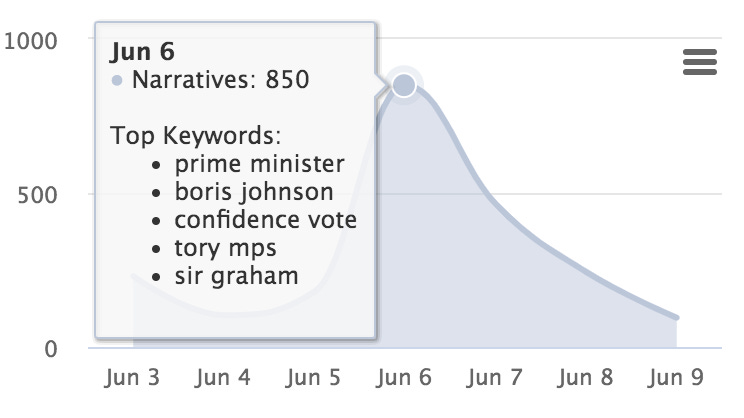
While the popularity of British Prime Minister Boris Johnson has been dwindling for some time now, this week has highlighted internal divisions over his leadership more than ever. From a noticeable presence of booing at the Queen’s Jubilee to a no-confidence vote on Monday, Boris Johnson seems to be losing his home crowd. Narrative intelligence captures the conversation surrounding the Prime Minister in European Media and gives insight into the events that have thrown him into the spotlight.
While the Queen’s Jubilee offered the potential for an escape from the political division in the UK, this respite did not last long. Upon Boris Johnson’s arrival to St. Pauls’s Cathedral for the celebration, the PM was met with a very mixed response from the crowd. While some Tory faithful were seen cheering for Johnson, audible booing made the encounter less than friendly. Transport secretary Grant Shapps advised against over-interpreting this booing, though the media has done little to silence the buzz surrounding Johnson’s rude welcome.
Consequently, European media mentioned the church as one of the most popular phrases in association with Boris Johnson with 834 unique mentions of St. Pauls's Cathedral. The booing proved only the start of a difficult stretch ahead for the Prime Minister.

No-confidence vote:
While Boris Johnson was able to shake off boos with a smile, it is becoming clear that many members of his own conservative party hold the same sentiment. On Monday, Boris Johnson was the subject of a vote of no-confidence. The vote of no-confidence is a parliamentary procedure in which members of the majority party can vote on whether or not a UK government’s leader is deemed fit to remain in power.
This vote completely took over the Boris Johnson narrative, with “confidence vote” bringing in over 1,500 separate mentions in European media. While the vote turned out in Johnson’s favor, the result was not exactly encouraging. The unimpressive 211 to 148 victory means that 41% of the conservative party are willing to oust their leader. The PM said the results were “decisive” but former PM Theresa May survived a no-confidence vote by even wider margins and was forced out of office just six months later. Though Johnson survived this vote, the tone of European media at large has cast doubt upon the sustainability of his tenure as UK’s leading political figure.

What went wrong:
Looking at top keyword mentions gives insight into what exactly went wrong with Boris Johnson. One key phrase, in particular, is “Sue Gray” (569 mentions). Sue Gray has taken the UK political scene by storm after she recently delivered a report that detailed “partygate”, the scandal that is at the center of Johnson’s troubles. Partygate is a series of allegations of parties that took place at 10 Downing street, the residence of Boris Johnson, over the course of Covid-19. These parties are said to be in violation of the law at the time despite Boris Johnson’s initial stance that they were legal. The PM was even fined for a birthday party in which covid-19 laws were violated. Following this report, Johnson has faced harsh criticism regarding his integrity and ability to lead.
Partygate is not the only thing of concern to MPs and British citizens alike, many political issues are brought into the narrative as well. Cost of living is one significant issue for UK citizens (525 mentions). The UK is in the middle of a cost of living crisis that has been intensified by COVID recovery as well as the war in Ukraine.
Additionally, questions are still in the air about how Johnson will address the rewriting of the Northern Ireland protocol, a 2019 Brexit provision that sought to avoid a hard trading border between Northern Ireland and the Republic of Ireland. This issue, mentioned 786 times, is at the forefront of Johnson’s political agenda as he tries to move past the drama surrounding the no-confidence vote. Despite these policies mentioned in this Kudzu brief, there is surprisingly little mention of policy issues on the whole. This is a possible indicator that UK citizens’ problem is bigger than just an issue of political decision-making.
Despite claims of success, the no-confidence results should be a major concern to backers of Johnson. Even as the PM lives to fight another day, conservative MP Phillip Ludlow warns that the situation “cannot endure”. Looking at media data, “general election” was mentioned over 500 different times. As the media has displayed, the recent vote is not an isolated event. Broader conversations about a future general election could be an indicator that Johnson’s actions may fare poorly for the conservatives in the next election. Media trends show that divisions in the UK’s conservative party are only growing deeper as Members of Parliament look ahead to a general election.
Mentions of Johnson’s negative reception, no-confidence vote, and scandals all point to what should be a major concern to conservative lawmakers. The media has made clear that Johnson’s survival is just that - survival. If the volume of mentions in European media is any indication of the global conservation, then it is a conversation about the uncertainty surrounding Boris Johnson’s future and the future of the conservative party.
Narrative intelligence captures the conversation surrounding Boris Johnson and shows just how vulnerable the media perceives his political standing to be.